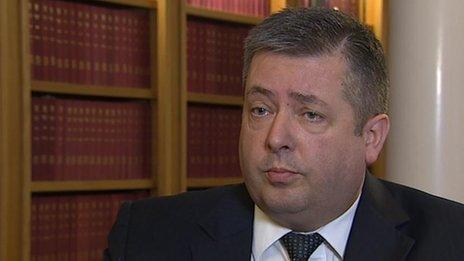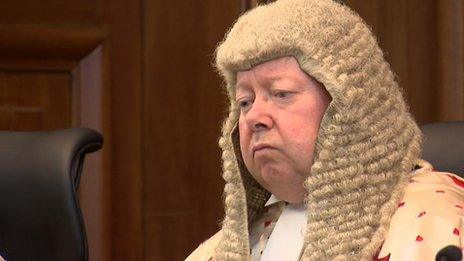Top Scottish judges oppose ending corroboration
- Published

Lord Hamilton and Lord Cullen have expressed concern about the plan
Two former heads of the judiciary in Scotland have spoken out against plans to abolish the general requirement for corroboration in criminal cases.
Lord Hamilton said the need for evidence to come from at least two sources was an "essential element" of the Scottish system.
In a separate interview, Lord Cullen said it could be a "safeguard against wrongful conviction".
Scottish government ministers want to end the requirement for corroboration.
Proposals to drop it are among a series of reforms contained in the Scottish government's Criminal Justice Bill, external.
Ministers believe more rape, sexual offence and domestic abuse cases would be heard in court if the current need for two different and independent sources of evidence was removed.
Scotland's top prosecutor, Lord Advocate Frank Mulholland, thinks that corroboration is denying access to justice to victims of crimes committed in private.
"In the past two years, 170 cases of rape have had no proceedings taken in them because of insufficient evidence, which in many instances is a lack of corroboration," Mr Mulholland said.
Lords Hamilton and Cullen - who have each served as Scotland's top judge - suggested that this issue could be addressed by more limited reforms.
Lord Cullen told the BBC consideration might be given to a system which would give a trial judge the power to suspend the need for corroboration in certain cases.

Lord Advocate Frank Mulholland says victims are being denied justice
Ministers have made clear they intend to press ahead with ending the requirement in principle.
'Quite dangerous'
Lords Hamilton and Cullen fear this could increase the likelihood of miscarriages of justice.
"There is a serious risk that that would be so," said Lord Hamilton.
"They should retain corroboration as an essential element of our criminal jurisdiction in Scotland," he said.
Lord Cullen added: "It's very important that (corroboration) is there and always has been for centuries as a safeguard against wrongful conviction."
Both men accepted that it was hard to prove that corroboration provided this protection. They said their experience on the bench had convinced them that it did.
The only other surviving former Lord President, Lord Hope of Craighead, has also said he would be "very sad" to see the safeguard go.
He said the change seemed "very far-reaching and, potentially, quite dangerous".

Lord Carloway proposed the changes to corroboration
The judges were echoing the concerns expressed by the man who currently occupies Scotland's highest judicial office.
The Lord President and Lord Justice General, Lord Gill, told Holyrood's justice committee that all but one of Scotland's high court judges opposed abolition.
The exception was Scotland's second most senior judge, Lord Carloway, who proposed the change.
Scotland is the only jurisdiction in the world to have a general requirement for corroboration.
The Scottish government's justice secretary, Kenny MacAskill, is a strong supporter of removing it.
"I listen respectfully to the judiciary and to the legal profession," he said.
"But I also have to take on board the views of those who have been suffering in silence behind closed doors, behind closed curtains where they are not, and have not been, getting access to justice."
Wrongful convictions
Victim Support Scotland, Rape Crisis and Scottish Women's Aid all support change, as do Police Scotland and the Crown Office.
The SNP convener of Holyrood's justice committee, Christine Grahame, has expressed reservations but the government should have the majority it needs to change the law.
The justice secretary has made clear that he is willing to make other changes to help guard against wrongful convictions.
He is proposing to raise the majority required for a 15-person jury to secure a conviction from eight to 10.
Lord Hamilton thinks the majority should be raised to 12 if corroboration is removed.
He also thinks judges would need to revise the circumstances in which they warned juries about the evidence that had been presented to them.
Lord Hamilton made his comments in what he said was his first television interview in more than 40 years as a lawyer.
He retired as Scotland's top judge in 2012 having succeeded Lord Cullen as Lord President and Lord Justice General in 2005.
Lord Hope was Lord President between 1989 and 1996.
- Published7 January 2014
- Published20 November 2013
- Published5 November 2013
- Published25 September 2013